|
Shellfish
found in and around Barnegat Bay |
|
Mollusks
Bivalves |
|
Phylum
mullusca Family bivalvia
A mollusk, such
as an oyster or a clam, that has a shell
consisting of two hinged valves |
|
Clams
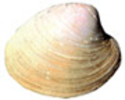
Species that live
buried in mud or sand and have valves (the two
pieces of the shell) of equal size. Clams
burrow by means of a muscular foot and are
filter feeders who draw in bay water which
contain food and oxygen.
<click here to learn more> |
|
Oysters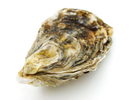
Species which attach
to rocks, pebbles or shells in colonies called
beds or reefs. Oysters have two shells which are
generally grey in color. The shells are
usually oval or pear-shaped, but vary widely in
form depending on what they attach to.
<click here to learn more> |
|
Mussels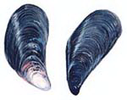
Species that have a
smooth, bluish-black shell often grow in clumps,
attaching themselves to rocks or to each other
by means of sticky filaments, sometimes referred
to as a "beard".
<click here to learn more> |
|
Scallops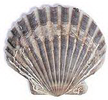
Species that have
shells which are ribbed and possess a
distinctive wing-like hinge. Adults can swim by
rapidly closing their shells and forcing water
out of the unhinged side of the paired shells
and propels them forward.
<click here to learn more> |
|
|
|
Arthropods
Crustaceans |
|
Phylum anthropoda
Subphylum crusacea
Aquatic
arthropods usually having a segmented body
and chitinous (tough, protective,
semitransparent) exoskeleton |
|
Crabs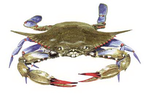
Species
characterized by a broad, semi-triangular
carapace (shell)
covering a joined thorax and abdomen, one
set of claws and four other pairs of legs.
Many species of crabs inhabit Barnegat Bay
<click here to learn more> |
|
Lobsters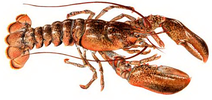
Species are
ten-legged crustaceans closely related to
shrimp and crabs. They are
bottom-dwelling, creatures found in all of
the worldâs oceans, as well as brackish
environments. |
|
Shrimp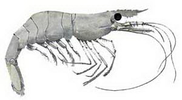
Species of small marine crustaceans with 10
jointed legs on the thorax, well-developed
swimmerets on the abdominal segments, and a
body that is compressed laterally. Shrimp
differ from their close relatives, the
lobsters and crabs, in that they are
primarily swimmers rather than crawlers
<click here to learn more> |
|
Krill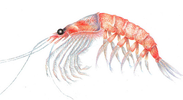
Species are tiny invertebrate animals that
are no more than 2 inches long. They look
similar to shrimp. They are found in all
oceans and are an important part of the food
chain. |
|
Barnacles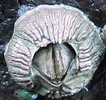
Species are crustaceans that have jointed
legs and shells of connected overlapping
plates. Instead of crawling after food, they
glue themselves to rocks, ships, pillings,
and even whales and wait for food to wash
by.
<click here to learn more> |
|
Mollusks
Gastropods |
Phylum mullusca Family
gastropodia
A Mollusk
having a single, usually coiled shell or no
shell, a ventral muscular foot and eyes
and feelers located on a distinct head |
|
Snails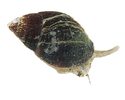
Species are soft-bodied type of mollusk that
are basically a head with a flattened foot.
The soft body is protected by a hard shell,
which the snail retreats into when alarmed.
Most snails eat living and decaying plants.
Some are scavengers and some are
predators.
<click here to learn more> |
|
Whelks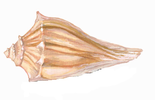
Species are large marine snails. They are
scavengers and carnivores, equipped with an
extensible proboscis
with which they bore holes through the
shells of crabs and mollusks. A large,
muscular foot helps to hold their victims.
<click here to learn more> |
|
Slugs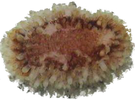
Species are marine gastropods that lacks a
shell as an adult and is usually brightly
colored. Sea slugs and
Nudibranchs,
creep along the bottom or cling to submerged
vegetation, usually in water just below the
low tide line. |
|
|
